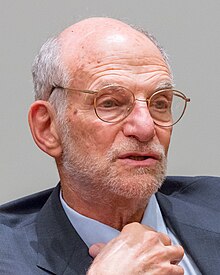Michael Rosbash
Michael Rosbash | |
|---|---|
 Michael Rosbash in Nobel Prize press conference in Stockholm, December 2017 | |
| Born | Michael Morris Rosbash March 7, 1944 Kansas City, Missouri, U.S. |
| Nationality | American |
| Alma mater | California Institute of Technology (B.S.) Massachusetts Institute of Technology (MS, PhD) |
| Spouse | Nadja Abovich |
| Awards | Gruber Prize in Neuroscience (2009) Nobel Prize in Physiology or Medicine (2017) |
| Scientific career | |
| Fields | Genetics Chronobiology |
| Institutions | University of Edinburgh Brandeis University Howard Hughes Medical Institute |
| Doctoral advisor | Sheldon Penman |
Michael Morris Rosbash (born March 7, 1944) is an American geneticist and chronobiologist of Jewish descent. Rosbash is a professor at Brandeis University[1] and investigator at the Howard Hughes Medical Institute. Rosbash's research group cloned the Drosophila period gene in 1984 and proposed the Transcription Translation Negative Feedback Loop[2] for circadian clocks in 1990.
Along with Michael W. Young and Jeffrey C. Hall, he was awarded the 2017 Nobel Prize in Physiology or Medicine "for their discoveries of molecular mechanisms controlling the circadian rhythm".[3][4]
References
- ↑ "Life Sciences Faculty – Michael Rosbash". www.bio.brandeis.edu. Archived from the original on 16 October 2018. Retrieved 2 October 2017.
- ↑ "The Drosophila Molecular Clock Model – HHMI's BioInteractive". www.hhmi.org. Archived from the original on 17 February 2013. Retrieved 2 October 2017.
- ↑ Cha, Arlene Eujung (2017-10-02). "Nobel in physiology, medicine awarded to three Americans for discovery of 'clock genes'". Washington Post. Retrieved 2017-10-02.
- ↑ "The 2017 Nobel Prize in Physiology or Medicine – Press Release". The Nobel Foundation. 2017-10-02. Retrieved 2017-10-02.